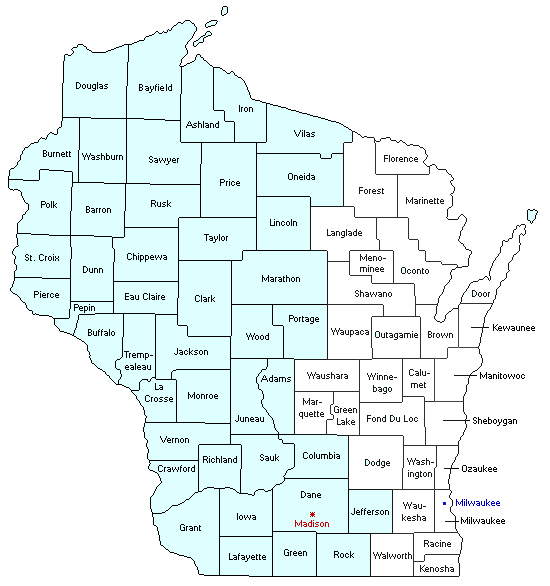About the Court
The United States Courts are an independent, national judiciary providing fair and impartial justice within the jurisdiction conferred by the Constitution and Congress. As an equal branch of government, the federal Judiciary preserves and enhances its core values as the courts meet changing national and local needs.
Judges
The Western District of Wisconsin currently has two District Judges and one full-time Magistrate Judge. The Chief Deputy Clerk of Court also serves as a part-time Magistrate Judge.
- Chief U.S. District Judge James D. Peterson
- U.S. District Judge William M. Conley
- U.S. Magistrate Judge Anita M. Boor
- U.S. Magistrate Judge Stephen L. Crocker
- Part-time Magistrate Judge Andrew Wiseman
Judicial Disclosures
The Judicial Conference has adopted a seminar disclosure reporting policy that requires educational program providers and judges to disclose certain information relevant to judges' attendance at privately-funded educational programs. This system is intended to assist program providers, courts and judges in making the necessary disclosures while providing public access to the information.
Any organization covered by the policy that issues an invitation to a federal judge to attend an educational program as a speaker, panelist or attendee and offers to pay for or reimburse the judge in excess of $305 must disclose financial and program information. Click the link below to view qualifying educational seminars reported by the District Judges of the Western District of Wisconsin.
Report of Judges' Attendance at Seminars for the Western District of Wisconsin
Judicial Conduct and Disability
Congress has created a procedure, set forth in 28 U.S.C. § 372(c), that allows any person to file a complaint alleging judicial misconduct or disability. Misconduct refers to conduct that interferes with the effective administration of the business of the courts, not the correctness of a particular ruling. If you believe a judge made a wrong decision, even a very wrong decision, you may not use this procedure. Instead, if you are a litigant, you must use the appeal process. An attorney can explain your right to appeal.
Links to the complaint form and the rules governing judicial misconduct or disability are given below. A complaint must be supported by evidence sufficient to raise an inference of misconduct or disability.
Jurisdiction
The Western District of Wisconsin comprises the following Wisconsin counties:
Adams, Ashland, Barron, Bayfield, Buffalo,Burnett, Chippewa, Clark, Columbia, Crawford, Dane, Douglas, Dunn, Eau Claire, Grant, Green, Iowa, Iron, Jackson, Jefferson, Juneau, La Crosse, Lafayette, Lincoln, Marathon, Monroe, Oneida, Pepin, Pierce, Polk, Portage, Price, Richland, Rock, Rusk, Sauk, St. Croix, Sawyer, Taylor, Trempealeau, Vernon, Vilas, Washburn, and Wood.

After Hours Filing
Documents may be filed 24 hours/day through the court's electronic filing system. A document that is posted to the system by 11:59 PM Central Time is considered filed on that day. The court does not maintain after-hours support, but filers may direct any questions or concerns to the ECF Help Desk at wiwd_ecfhelp@wiwd.uscourts.gov
Operations staff will be available to assist you during regular business hours.
Electronic Devices in the Courtroom
Please turn off mobile phones before entering the courtroom. Attorneys may use laptops or tablets for trials and other hearings, but the court does not allow the use of cameras or ANY OTHER ELECTRONIC DEVICES in the public galleries without the express permission of the presiding judge. Wireless access is available to attorneys at no charge. Please contact the clerk's office or the courtroom deputy for more information.
Pursuant to policy established by the Judicial Conference of the United States Courts, the following is the current policy for cameras in trial courts:
A judge may authorize broadcasting, televising, recording, or taking photographs in the courtroom and in adjacent areas during investitive, naturalization, or other ceremonial proceedings. A judge may authorize such activities in the courtroom or adjacent areas during other proceedings, or recesses between such other proceedings, only:
1) for the presentation of evidence;
2) for the perpetuation of the record of the proceedings;
3) for security purposes;
4) for other purposes of judicial administration;
5) for the photographing, recording, or broadcasting of appellate arguments; or
6) in accordance with pilot programs approved by the Judicial Conference.
When broadcasting, televising, recording, or photographing in the courtroom or adjacent areas is permitted, a judge should ensure that it is done in a manner that will:
1) be consistent with the rights of the parties,
2) not unduly distract participants in the proceeding, and
3) not otherwise interfere with the administration of justice.
Directions to the Courthouse
Case Assignments
Information about district court cases is available through PACER or by calling the clerk's office.
Bar Associations
Attorneys practicing before this court may find the resources at the following bar associations helpful.
-
Western District of Wisconsin Bar Association
It is the mission of the Western District of Wisconsin Bar Association to promote the just, speedy, respectful and efficient determination of every action filed in the District Court: by acting as an effective liaison among the District Court, federal practitioners, litigants and the public; by encouraging, fostering and supporting educational opportunities that improve the practice of law in this District; and by serving the needs of the District Court, federal practitioners, litigants, and the public.
-
State Bar of Wisconsin (WisBar)
The mission of the State Bar of Wisconsin is to improve the administration of justice and the delivery of legal services and to promote the professional interests of Wisconsin lawyers.
